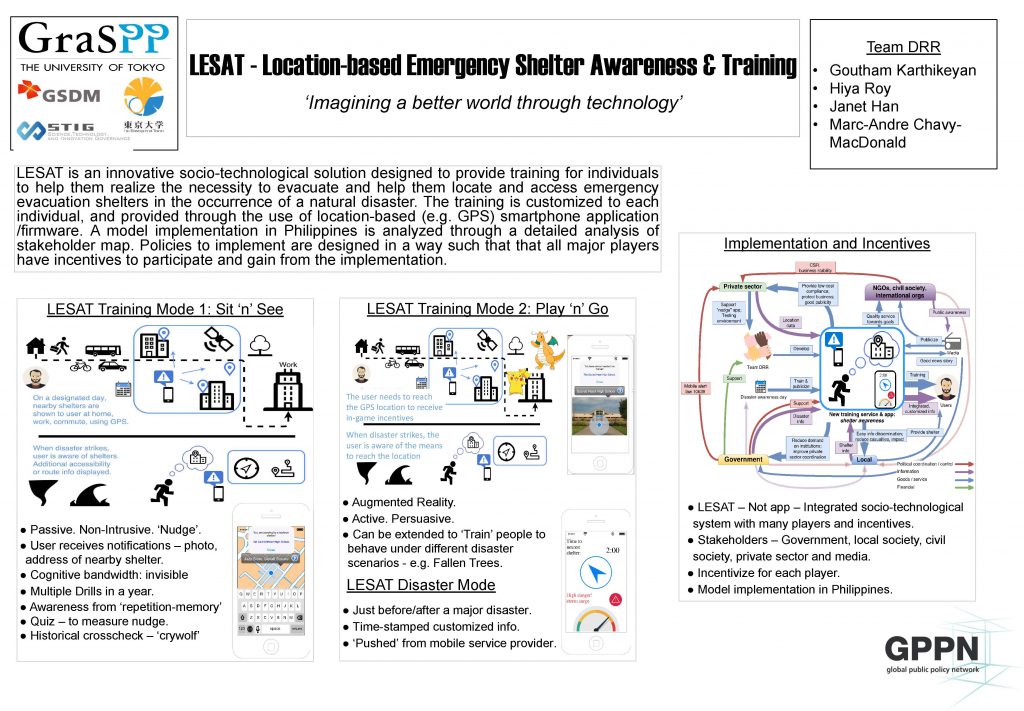The 10th annual GPPN Conference, hosted by the Sciences Po School of Public Affairs, featured students’ solution oriented ideas and prototypes to address public policy challenges identified by the UN Sustainable Development Goals (SDGs). To participate, each GPPN member school carefully selected up to five student teams to present their projects and compete for the GPPN prize. The result: 32 teams from around the world met in Paris to showcase their ideas on how to solve some of the most pressing global challenges of today.
The idea behind this design is to tap into ‘pre-existing socio-technological behavior’ prevalent in the 21st century – widespread popularity and usage of “smartphones”. According to the Ericsson Mobility Report, 2016, the smartphone penetration in Philippines is around 40% with predictions of up to 70% by 2020. Meanwhile, Myanmar is rivaling developed countries with an estimated penetration of around 80%. Our proposal combines this rapidly developing trend along with the necessity to provide customized information about emergency evacuation shelters to individuals utilizing the location awareness capability (GPS) present in a smartphone. Also in the absence of GPS in the phone, the approximate location could be identified by using triangulation between three or more radio towers. LESAT is a location-based technology (application/firmware) that provides customized information to its users and, since it requires the development of only an ‘app’, is of significantly lower investment and potentially massively scalable. LESAT works in 3 modes. 2 modes are used for training – before the disaster, and the final mode is used to provide customized info to the user in the aftermath of one.
Meet the team

Marc-Andre Chavy-Macdonald (University of Tokyo, Department of Systems Innovation, Tokyo, Japan). Born in Canada, I did a Bachelor of Science in Physics and Math at Dalhousie University. After some travels, I did the Erasmus Mundus SpaceMaster programme, getting a Master’s in Space Science and Technology. My thesis at the European Space Agency was on radiation protection strategies and design for manned missions. Since 2015 I am a doctoral student researching on “Systems architecture”, or how to design a complex engineering system in its early phases, which I hope to apply to space. I am also completing a minor in Technology Management, and both STIG & GSDM.

Goutham Karthikeyan is a Doctoral Student at the Department of Aeronautics and Astronautics, The University of Tokyo. His doctoral research involves the computational study of combustion instabilities in hybrid rocket engines. His allied interests include space policy and technology innovation in the space sector. His recent work examines the complex dynamics involved in the process of development, procurement and utilization of space-based assets to address the disaster risk reduction needs of a nation. Karthikeyan is also a student of the Global Leader Program for Social Design and Management of The University of Tokyo.

Hiya Roy: I am a second year Master’s student of Electrical Engineering and Information Systems Department, University of Tokyo and a member of Global Leader Program for Social Design and Management. Currently my research revolves in the field of Machine Learning and Artificial Intelligence to solve the satellite image recognition problems and the outcome of this research can be directly linked to address social issues like food security, disaster management etc. Born and raised in a multicultural setting in India, I am an avid lover of culture. Personally I am an amateur Indian classical dancer and a travel enthusiast.

Janet Han is a second year Master’s student at the University of Tokyo’s Graduate School of Public Policy. Having developed a deep passion for tackling international challenges confronting our modern world, she is dedicated to a professional career as a policy analyst addressing key issues in poverty, human rights, energy, and climate change. She fervently believes devising and implementing effective policies that produce viable results is of critical importance. Janet also holds a B.A. from University of California, San Diego where she majored in International Studies-Political Science, with a regional specialization in East Asia and a minor in business.


